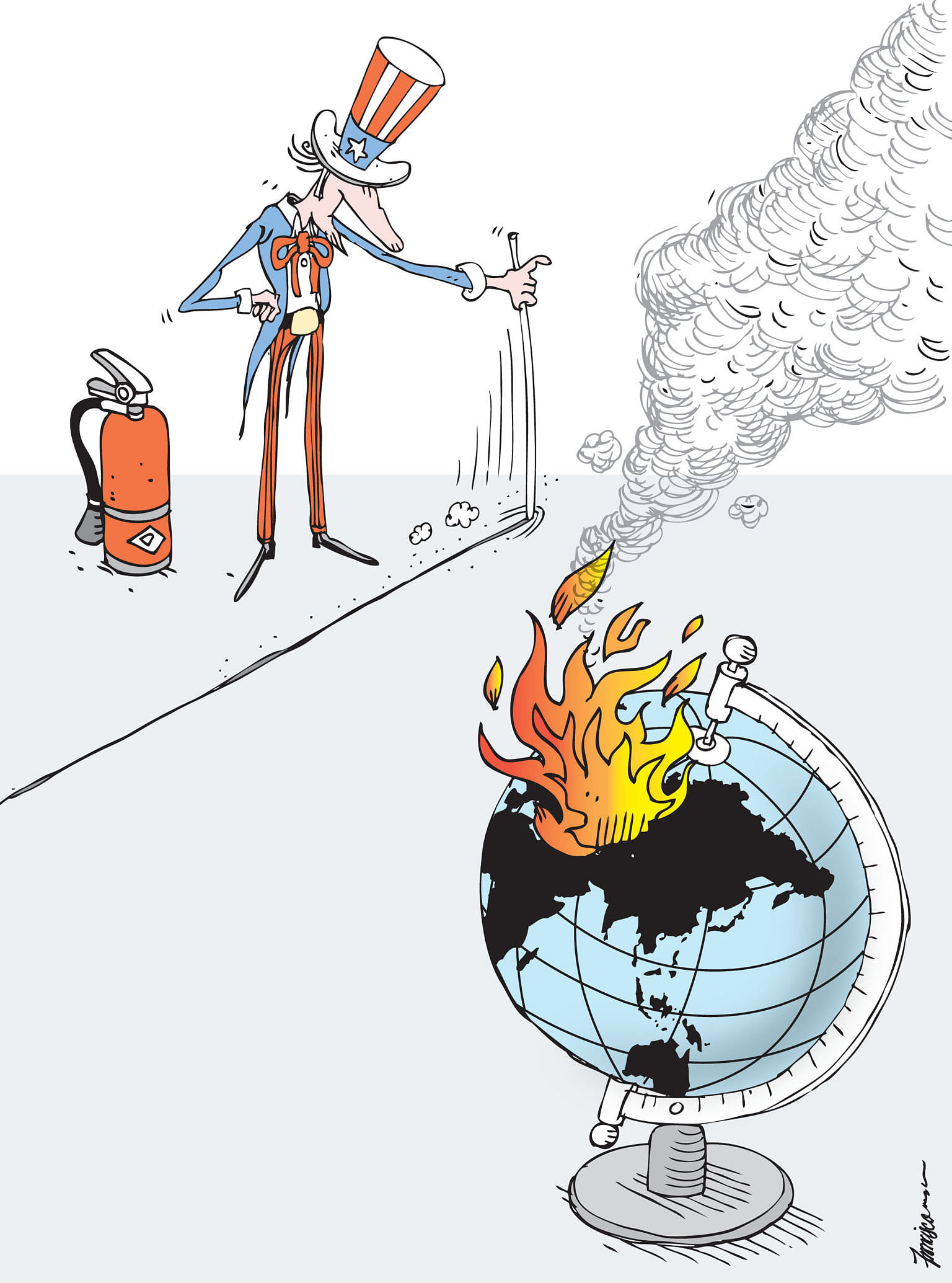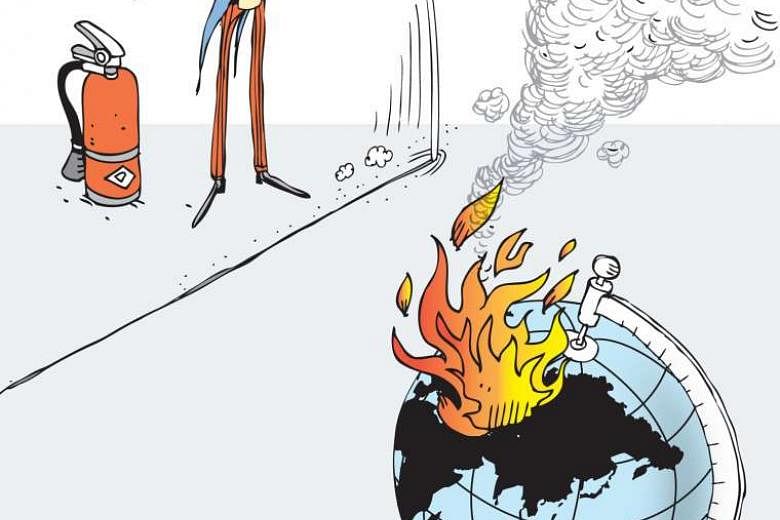LONDON • The USS Harry S.Truman, one of America's mightiest aircraft carriers, arrives in the Gulf this week to ramp up air strikes against the so-called Islamic State in Iraq and Syria (ISIS) terrorist organisation. The Truman is also delivering an important political message of commitment: Its arrival marks the end of a gap of three months during which the US didn't have any aircraft carrier in the region.
And in another sign of renewed US commitment, the US successfully sponsored over the weekend the adoption of a new United Nations Security Council resolution which raises the possibility of a political settlement to the cruel civil war in Syria.
But it would take much more than just these two disparate moves for the US to re-establish its traditional leadership role in the Middle East. For seasoned politicians and diplomats in the region cannot recall a period when the US counted for so little in the Middle East, and when America's strategic posture was not held in such contempt, by both friend and foe alike.
Predictably, White House officials strenuously deny such criticism; they point out that the US Air Force is pounding terrorists throughout the region, that not a week passes by without President Barack Obama receiving some Middle Eastern leader in Washington, and that at 45,000 troops in the Middle East, the US military contingent there still packs a bigger punch than the national armies of most other countries in the world.
All very true, yet not particularly relevant. For there are few politicians or analysts in either the Arab world or Israel who would dissent from the view that America's regional footprint is fading. It's not only Iran which is acting more brazenly by encouraging its proxies to fight openly for regional influence, but also America's allies such as Saudi Arabia who are now openly defying US advice and engaging in their own military adventures.
Even Israel is no longer America's stalwart ally: The Jewish state simply brushed aside months of intensive US diplomacy to address the Palestinians' plight and refused to criticise the Russian military involvement in Syria. And no wonder, because US policy in the region changes so rapidly and so frequently as to give any observer a bad dose of vertigo.
As the wave of revolutions known as the Arab Spring swept through the Middle East, the US quickly announced that it was siding with "democracy" and dumped Egyptian President Hosni Mubarak, its most important regional ally, in charge of the Arab world's most populous nation.
But the US did nothing as Mr Mubarak's Muslim Brotherhood successors monopolised power, and Washington remained silent when the Egyptian military then took over.
The result is that America merely succeeded in annoying everyone: According to the latest surveys of the Pew Research Centre, a US-based think-tank specialising in opinion polling, no less than 85 per cent of ordinary Egyptians have negative opinions of the US, an astonishing result in a country which, after Israel, has been the main beneficiary of US aid for decades.

The same confused US policy was applied to the other current Middle East crisis, Syria. For the first two years of the Syrian civil war, President Obama's only policy was to let regional states, especially Saudi Arabia, Qatar and Turkey, fight the regime of Syrian President Bashar al-Assad; unsurprisingly, this only resulted in the intensification of the war and the rise of a network of terrorist organisations.
President Obama then drew a "red line" in the Middle East sand: If the Assad regime continued to gas its people, the US would intervene. Mr Assad's military did precisely that, the US military was put on high alert for air strikes, but then was stood down again by Mr Obama. To this day, the President refuses to acknowledge the catastrophic damage this did to US reputation worldwide. But those who were his top security advisers have no doubt on this score: "There's no question in my mind that it hurt the credibility of the President's word," says Mr Chuck Hagel, the former US defence secretary.
RETICENCE IN WILL
The "now you see it, now you don't' policies continue. For years, the US demanded the removal of President Assad, a classic example of a meaningless policy in itself, since Washington did nothing to topple Mr Assad but still found itself hamstrung in pursuing all diplomatic avenues. But the new UN Security Council resolution on Syria sponsored by the US over the weekend explicitly accepted that Mr Assad will remain in control. This is a diplomatic capitulation of the worst sort: one which will satisfy nobody in the region.
Nor is the US military offensive against the ISIS terrorist organisation as impressive as it's made out to be. Over a period of 18 months until the middle of December, the US-led coalition claims to have performed 9,000 air sorties against terrorist targets in Syria and Iraq, which translate into a mere 22 sorties a day, compared to 1,110 sorties a day during the first Gulf War of 1990, and 800 during the second Gulf War of 2003. Unsurprisingly, therefore, ISIS continues to retain control over a vast territory. Professor Stephen Walt of Harvard University recently summed up the "unbearable lightness" of America's Middle East operations by quoting an old humorous US rhyme: "When in danger or in doubt, run in circles, scream and shout."
One of the most frequent explanations for the Obama administration's reticence to impose its will in the Middle East is US public opinion, which is supposedly tired of foreign policy adventures and opposes further military interventions. But the reality is that the US public was initially hostile to most US military interventions over the past century, including those in the two world wars, and successive presidents have managed to sway the public towards supporting military operations by articulating a clear and convincing case for the use of US power. Therefore, the real restriction on Mr Obama's foreign and security policy is not the US public, but the President himself.
The hallmark of the current US administration is its obsessive determination to micro-manage every security crisis not primarily in order to address the crisis itself, but in order to ensure that what the White House likes to call "the optics", namely how the crisis plays up in the media, plays out in favourable terms for the President. And that often comes at the expense of timely and wise decisions.
The National Security Council (NSC), the primary instrument of US presidential control over military matters, has grown to 400 employees under Mr Obama, four times its size two decades ago. And although the NSC's main job is to coordinate action between government departments, precisely the opposite is the outcome: The NSC often runs its own policies (even the US State Department did not know about Mr Obama's initiative to reach out to communist-controlled Cuba until that initiative was well advanced) and spends most of the time debating process rather than outcome.
Matters are not helped by President Obama himself, who seems to be most comfortable not as commander-in-chief, but in the role of a university professor who is very good at picking holes in other people's arguments, but somehow neglects setting out his own ideas about how to tackle security challenges. It is noticeable that, whenever faced with a new crisis, Mr Obama responds by outlining what he won't do, rather than what he will do. One can't help feeling that the US President simply does not understand the concept of military power, how it should be used and what psychological impact it has on an adversary.
And neither the President nor his Secretary of State John Kerry seems to be aware of the basic fact that America's ability to persuade others to do what Washington wants them to do is directly related to the US contribution to the management of any particular crisis; "leading from behind" by telling others what they must do and assuming that they'd do as they are told isn't working and won't work. But that doesn't prevent either the President or Mr Kerry from trying.
The bitter final irony is that a president who came into office determined to stabilise the Middle East by withdrawing US military commitments from the region will leave behind a Middle East in flames, a region from which the US will find it hard to extricate itself.
But dealing with that headache will be a task for the next White House occupant.


